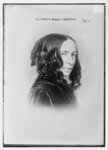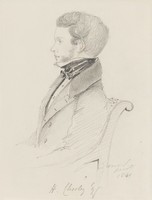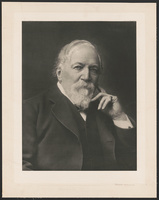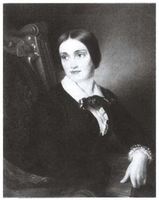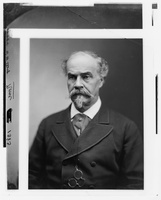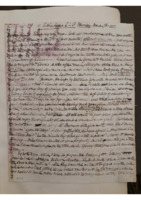Letter from Elizabeth Barrett Browning to Henry Fothergill Chorley, Aug 10, 1853
Dublin Core
Title
Subject
Description
Credit
The Brownings CorrespondenceCreator
Source
Publisher
Date
Type
Letter Item Type Metadata
Text
My dear Mr Chorley
I cant [sic] bear that you should intimate by a half word that you are “a creature to be eaten” .. viz—not to have your share in friendship & confidence. Now if you fancy that we, for instance, dont [sic] affectionately regard you, you are very wrong, & I am very right for feeling inclined to upbraid you. I take the pen from Robert—he would take it if I did not .. we scramble a little for the pen which is to tell you this, which is to say it again & again & be dull in the re-iteration, rather than not instruct you properly .. as we teach our child to read .. D O G, dog .. D O G, dog .. D O G, dog … Says Robert, "What a slow business!" Yet he’s a quick child—and you too must be quick & comprehending or we shall take it to heart sadly. Often I think & we say to one another, that we belied ourselves to you in England. If you knew how at that time, Robert was vexed & worn—why, he was not the same even to me. He seemed to himself to be slipping out of waistcoats & friends at once—so worn & teazed he was!– But then & now believe that he loved & loves you. Set him down as a friend, as somebody to "rest on" after all,—& dont [sic] fancy that because we are away here in the wilderness (which blossoms as a rose to one of us at least) that we may not be full of affectionate thoughts & feelings towards you in your different sort of life in London. So sorry we are .. I especially for I think I understand the grief especially .. about the household troubles which you hint at & Mr Kenyon gave us a key to–I quite understand how a whole life may seem rumpled up & creased, torn for the moment .. only you will live it smooth again dear Mr Chorley—take courage– You have time, & strength & good aims—& human beings have been happy with much less. I understate your advantages on purpose, you see– I heard you talked of in Florence when Miss Cushman in the quarter of an hour she gave us at Casa Guidi, told us of the oath she had in heaven to bring out your play & make it a triumph– How she praised the play .. & you!– Twice I have spoken with her—once on a balcony, on the boulevard when together we saw Louis Napoleon enter Paris in immediate face of the empire, & that once in Florence. I like the "manly soul" in her face & manners. Manly, not masculine—an excellent distinction of Mrs Jameson’s– By the way we hear wonderful things of the portrait painted of Miss Cushman at Rome, by Mr Page the artist, called 'the American Titian' by the Americans.
Your account of dear Miss Mitford made me sad & would have made me sadder if I had relied as much as you did on the testimony of her servants. Certainly the powerlessness was synchronous with the fall from the carriage, which fact seems to remove her from the category of ordinary paralytic patients– She has always told me that it was an injury, a laceration of the nerves: she never represented the illness to me as arising from sprain or rheumatism, though rheumatism might combine with it, she thought, in producing the difficulty of moving– Also, when I heard last from her, she was able to drive out .. a decided advance. Ah well! I do hope & trust that our dear friend may rally & recover yet. I cant bear to despond about her, & the light is not actually shut out. Those servants (that K.) always take the darkest view they can of her. I have observed that before. I dont like K– I must tell you. You need’nt tell Miss Mitford that I say so. She knows it very well, and I would not teaze her, particularly now, for the world. But I dont like K. I dont believe in K. .. I, who believe in : : : :
There I stop, not to "fret" you beyond measure. Besides now that you Czars of the Athenæum have set your Faradays on us, ukase & knout, what Pole, in the deepest of the brain, would dare to have a thought on the subject? Now that Prof. Faraday has "condescended," as the Literary Gazette affectingly puts it, (and the condescension is sufficiently obvious in the latter .. "how we stoop"!!) .. now that Prof. Faraday has condescended to explain the whole question which had offered some difficulty it is admitted, to "hundreds of intelligent men including five or six eminent men of science” in Paris, and, we may add, to thousands of unintelligent men elsewhere, including the eminent correspondent of the Literary Gazette, .. let us all be silent for evermore– For my part I wont[sic] say that Lord Bacon would have explained any question to a child even, without feeling it to be an act of condescension. I wont [sic] hint under my breath that Lord Bacon reverenced every fact as a footstep of Deity, & stooped to pick up every rough ungainly stone of a fact, though it were likely to tear & deform the smooth wallet of a theory. I, for my part, belong, you know, not to the "eminent men of science,["] nor even to the "intelligent men" .. but simply to the women, children, (& poets?)—and if we happen to see with our eyes a table lifted from the floor without the touch of finger or foot, let no dog of us bark .. much less a puppy-dog!– The famous letter holds us gagged. What it does not hold, is the facts—but en revanche the writer & his abettors know the secret of being invincible .. which is, not to fight. My child proposed a donkey-race yesterday .. the condition being .. that he should ride first. Somebody told me once that when Miss Martineau has spoken eloquently on one side of a question, she drops her ear-trumpet to give the opportunity to her adversary– Most controversies, to do justice to the world, are conducted on the same plan & terms.
What I do venture however to say, is, that its not all over in Paris because of Faraday’s letter. Ask Lamartine. What I hear & what the Literary Gazette hears from Paris is by no means the same thing. I hear Hebrew while the Gazette hears Dutch—a miracle befitting the subject .. or, what was once considered to be the subject, (I beg Professor Faraday’s pardon) before it was annihilated–
How pert women can be, cant [sic] they, Mr Chorley? .. particularly when they are safe among the mountains, shut in with a row of seven plane-trees joined at top– I wont [sic] go on to offer myself as "spiritual correspondent to the Athenæum", though I have a modest conviction that it might increase your sale considerably. Ah, tread us down! put us out! You will have some trouble with us yet– The opposition Czar of St Petersburgh supports us, be it known, & Louis Napoleon comes to us for oracles– The King of Holland is going mad gently in our favour—"quite absorbed" says an informant– But I wont [sic] quote Kings. It is giving oneself too great a disadvantage.
We stayed in Florence till it was ovenheat, & then we came here where it was fire-heat for a short time, though with cool nights comparatively, by means of which we lived, comparatively too. Now it is cool by day & night. You know these beautiful hills? the green rushing river which keeps them apart—the chesnut woods .. the sheep-walks & goat walks .. the villages on the peaks of the mountains like wild eagles .. the fresh unworn, uncivilized, world-before-the-flood look of everything. If you dont know it, you ought to know it. Come & know it, do. We have a spare bedroom which opens its door of itself at the thought of you .. & if you can trust yourself so far from home, try for our sakes. Come & look in our faces & learn us more by heart & see whether we are not two friends– I am so very sorry for your increased anxiety about your sister– I scarcely know how to cheer you or rather to attempt such a thing, but it did strike me that she was full of life when I saw her– It may be better with her than your fears, after all. If you would come to us you would be here in two hours from Leghorn—& there’s a telegraph at Leghorn .. at Florence– Think of it, do. The Storys are at the top of the hill—you know Mr & Mrs Story. She & I go backward & forward on donkeyback to tea drinking & gossipping at one another’s houses, & our husbands hold the reins. Also Robert & I make excursions, he walking as slowly as he can to keep up with my donkey. When the donkey trots we are more equal. The other day we were walking,—& I, attracted by a picturesque sort of ladder bridge of loose planks thrown across the river, ventured on it, without thinking of venturing—Robert held my hand. When we were in the middle, the bridge swayed, rocked backwards & forwards, & it was difficult for either of us to keep footing. A gallant colonel who was following us went down upon his hands & knees & crept. In the meantime a peasant was assuring our admiring friends that the river was deep at that spot, & that four persons had been lost from the bridge– I was so sick with fright that I could scarcely stand when all was over, never having contemplated an heroic act. "Why, what a courageous creature you are!" said our friends. So, reputations are made, Mr Chorley!
Yes, we are doing a little work, both of us. Robert is working at a volume of lyrics, of which I have seen but a few, & those seemed to me as fine as anything he has done. We, neither of us, show our work to one another till it is finished– An artist must, I fancy, either find or make a solitude to work in .. if it is to be good work at all. This, for the consolation of bachelors!
I am glad you like Mr Powers’s paper. You would have "fretted" me terribly if you had not—for I liked it myself, knowing it to be an earnest opinion & expressive of the man. I had a very interesting letter from him the other day. He is devout in his art, & the simplest of men otherwise.
Mr Story is about the statue of his father in Rome, & to judge from the calotype it must be good—a great deal of calm vitality in the attitude & general expression. We shall all be in Rome together this winter, if nothing hinders, & you will have Robert & me in London next summer if we are alive, I suppose—it is our fixed intention at present. Then we shall settle in Paris——only I never can give up Italy, Mr Chorley—we must come back to Italy now & then. Dont [sic] you think its a priviledge to live without coughing? .. to set aside reasons more poetical. Now I will ask you to write to us– It is you who give us up, indeed. Will your sister accept our true regards & sympathies? I shall persist in hoping to see her a little stronger next spring—or summer rather. May God bless you– I will set myself down & Robert with me as faithfully & affectionately yours
Elizabeth Barrett Browning.


